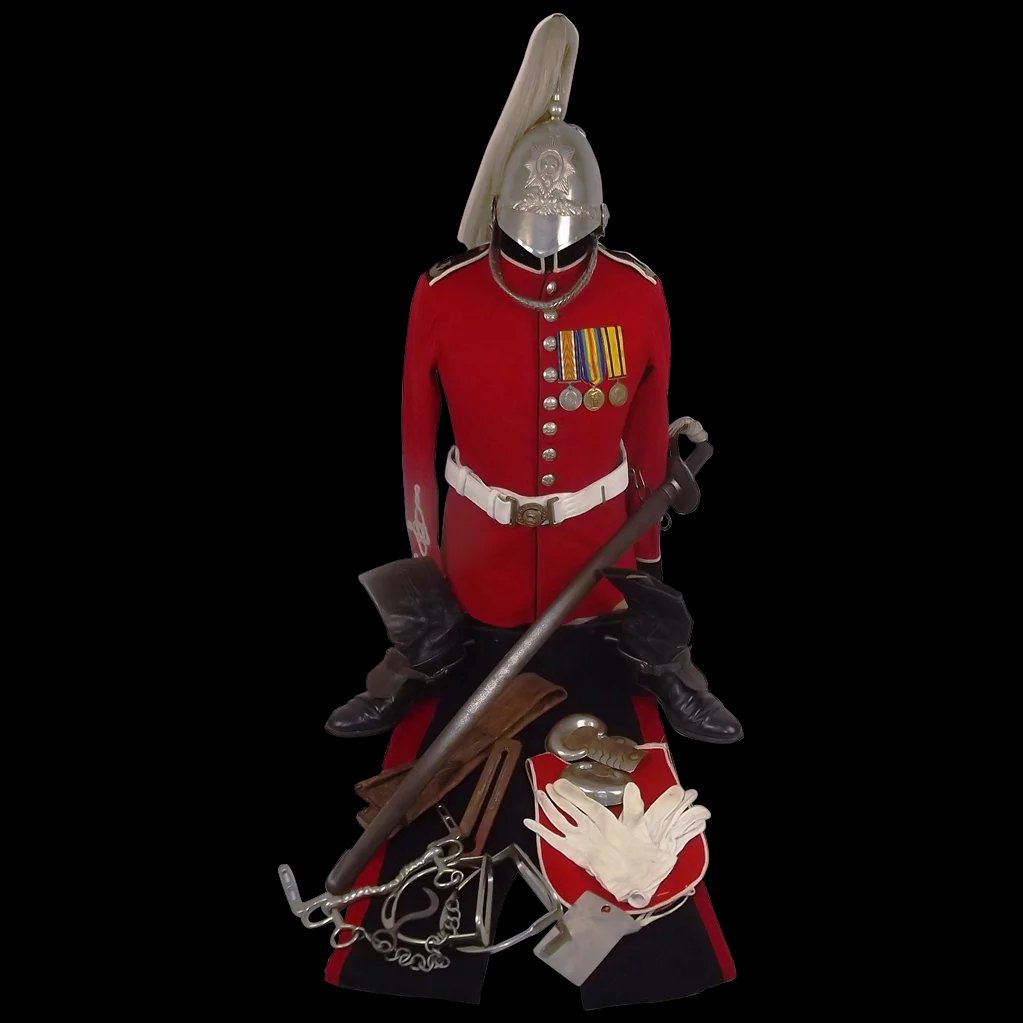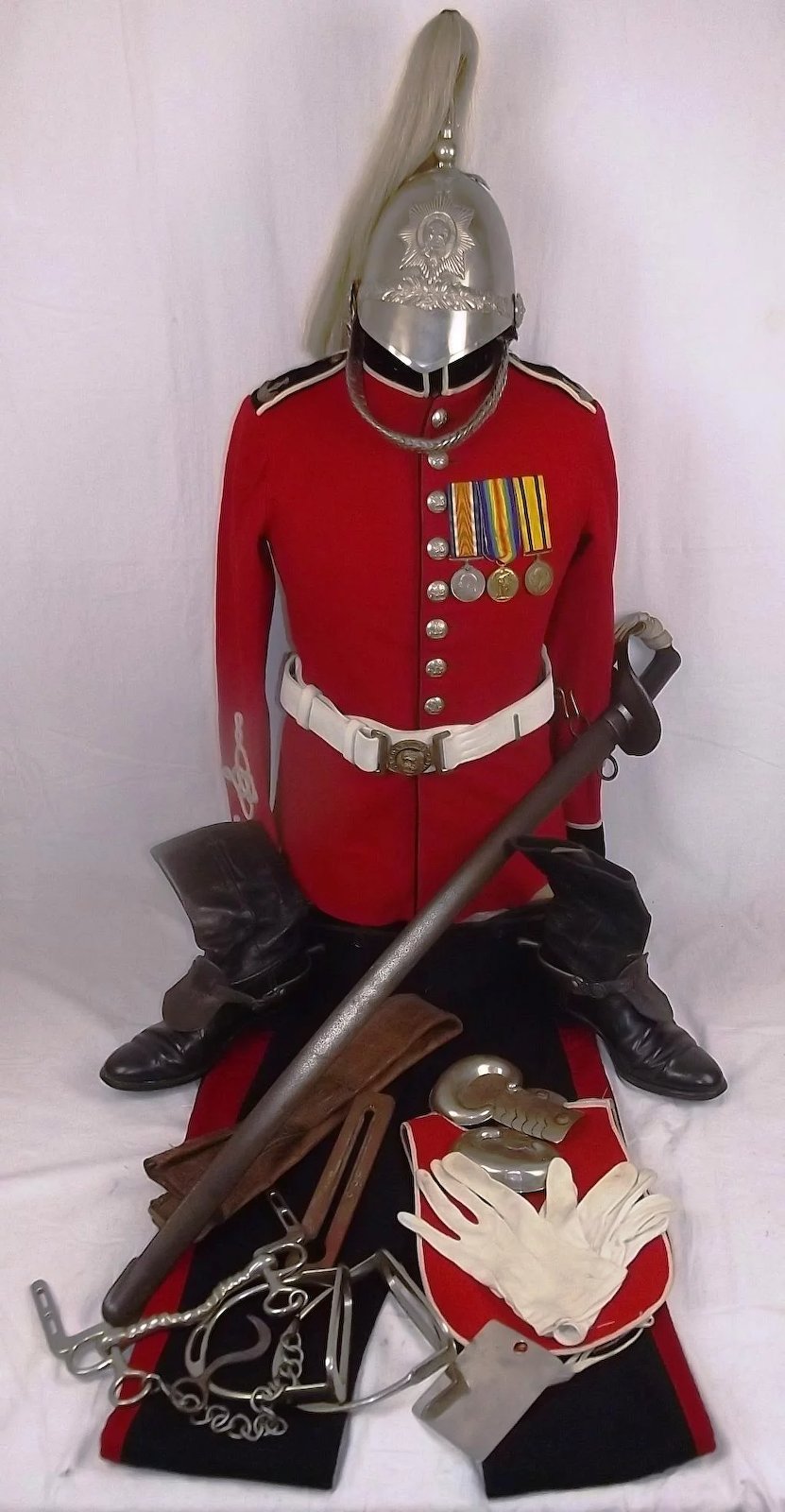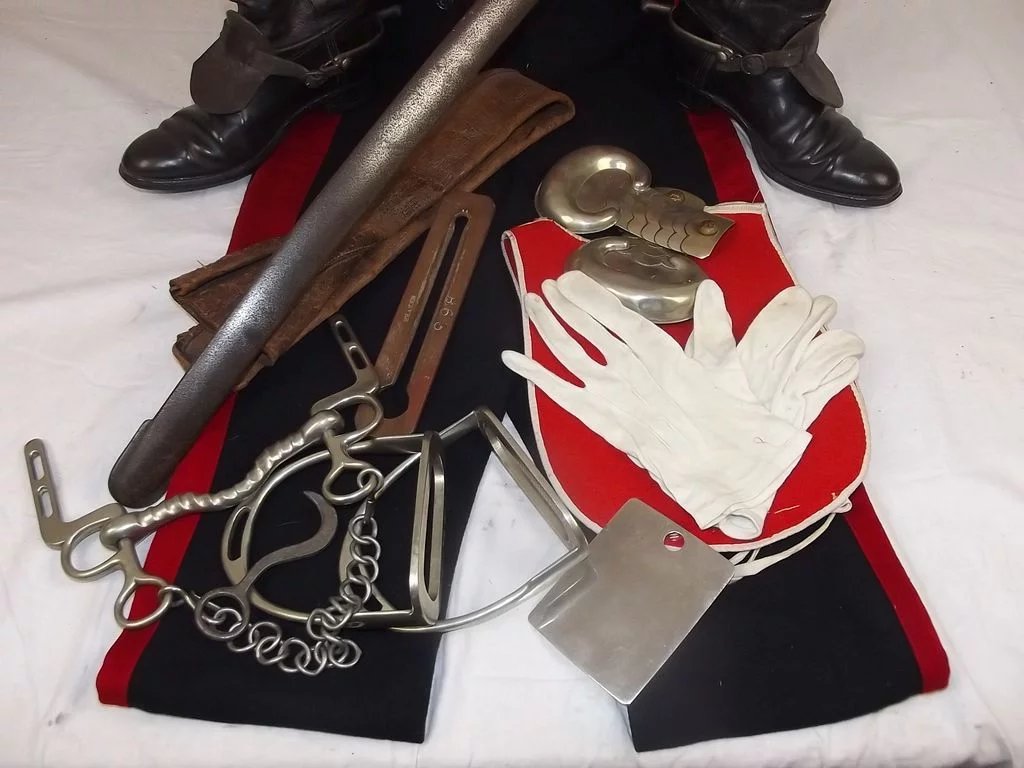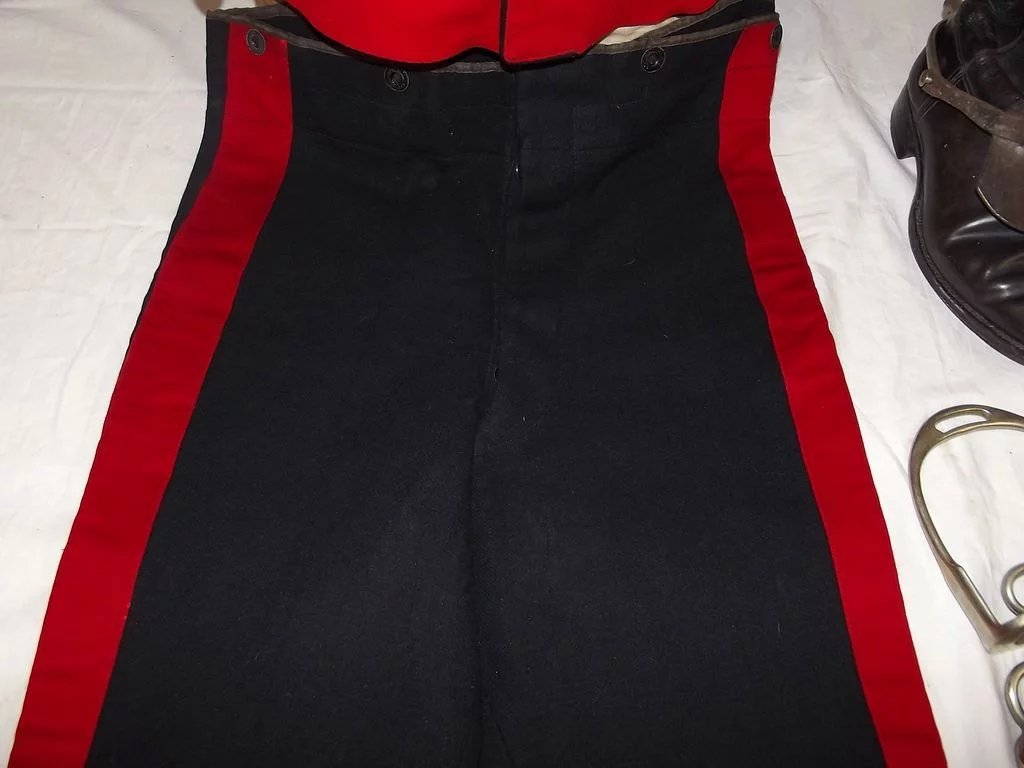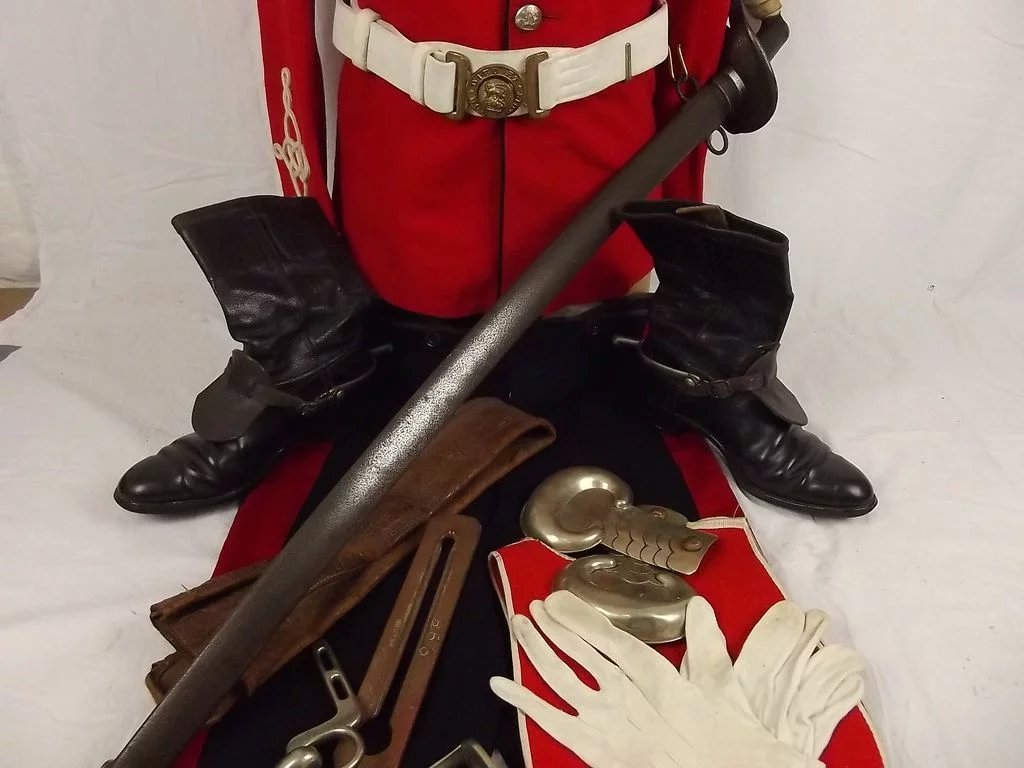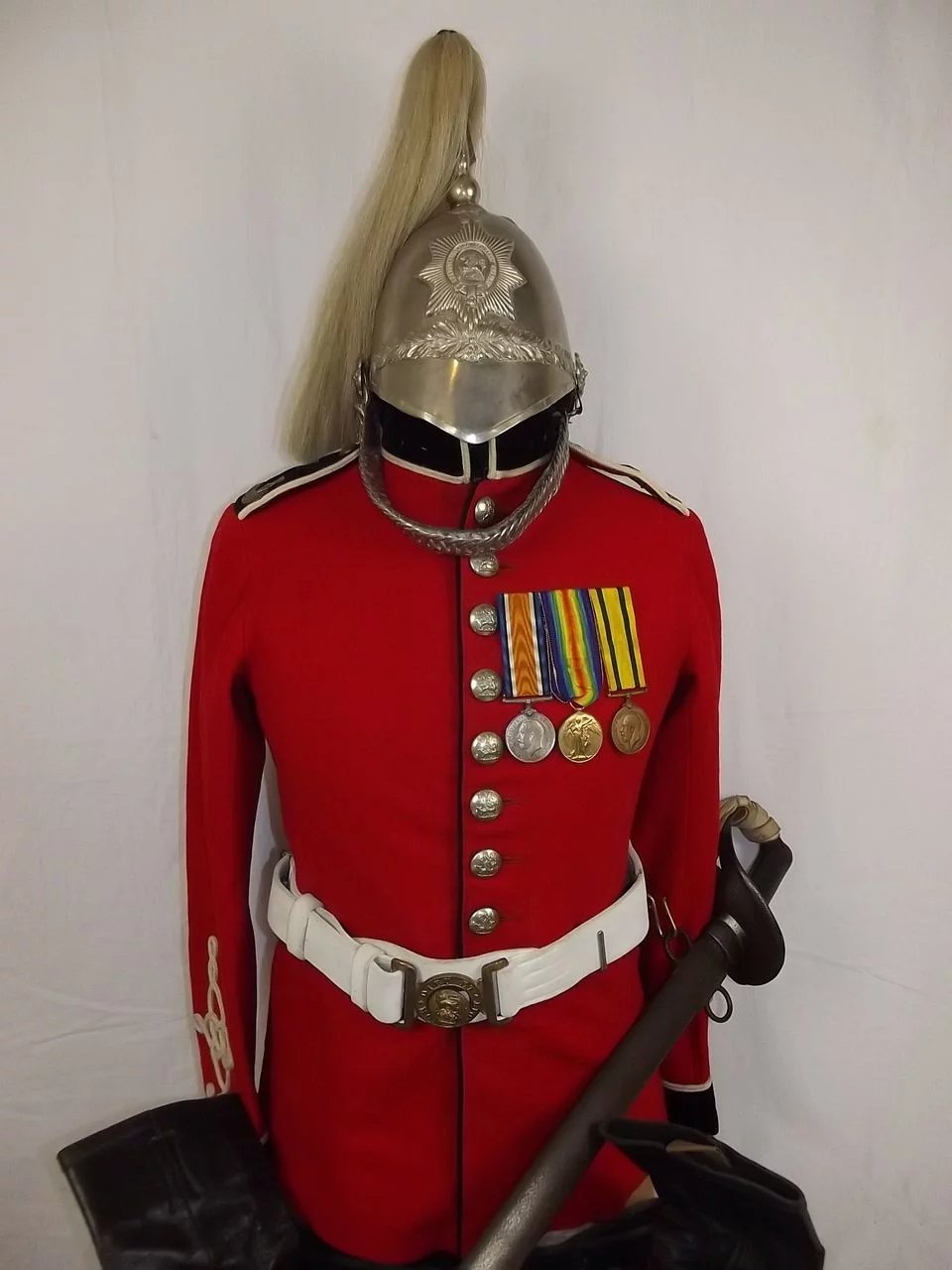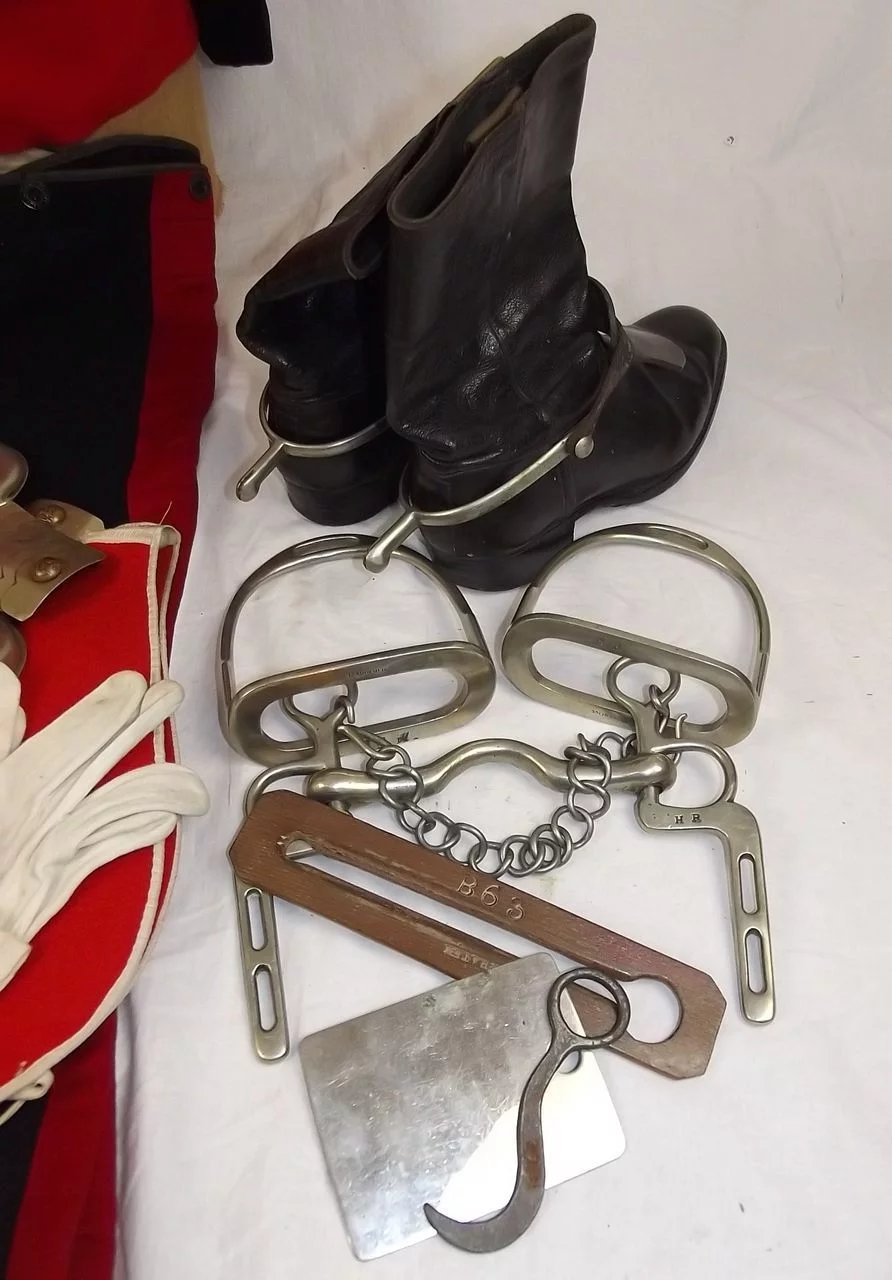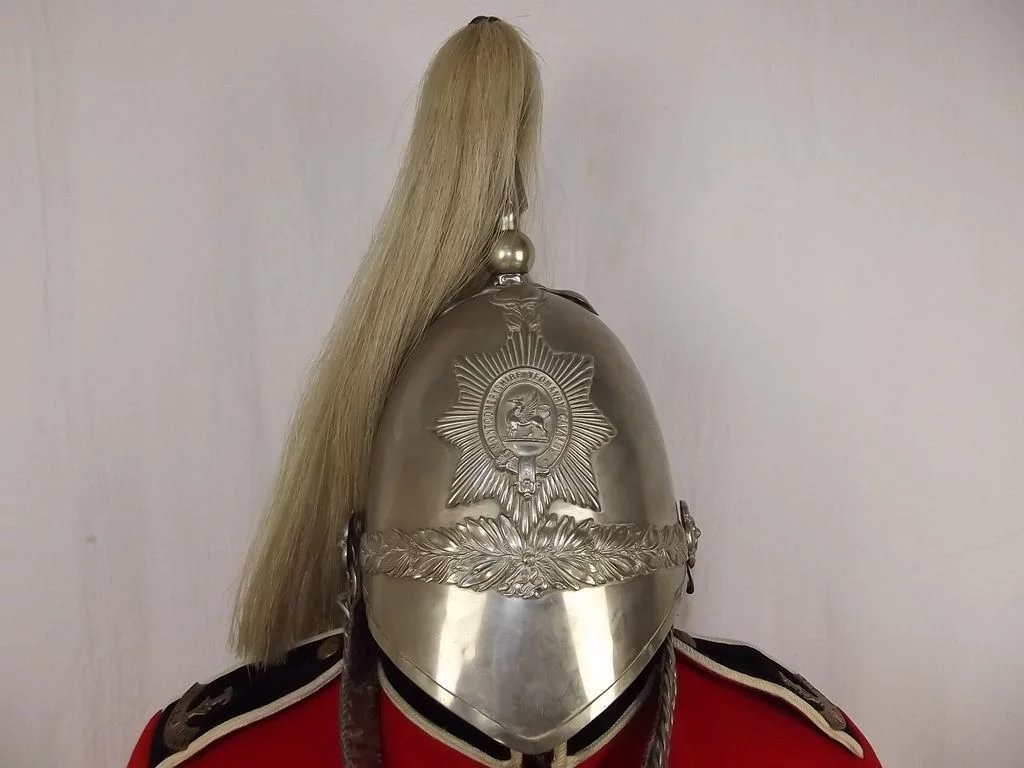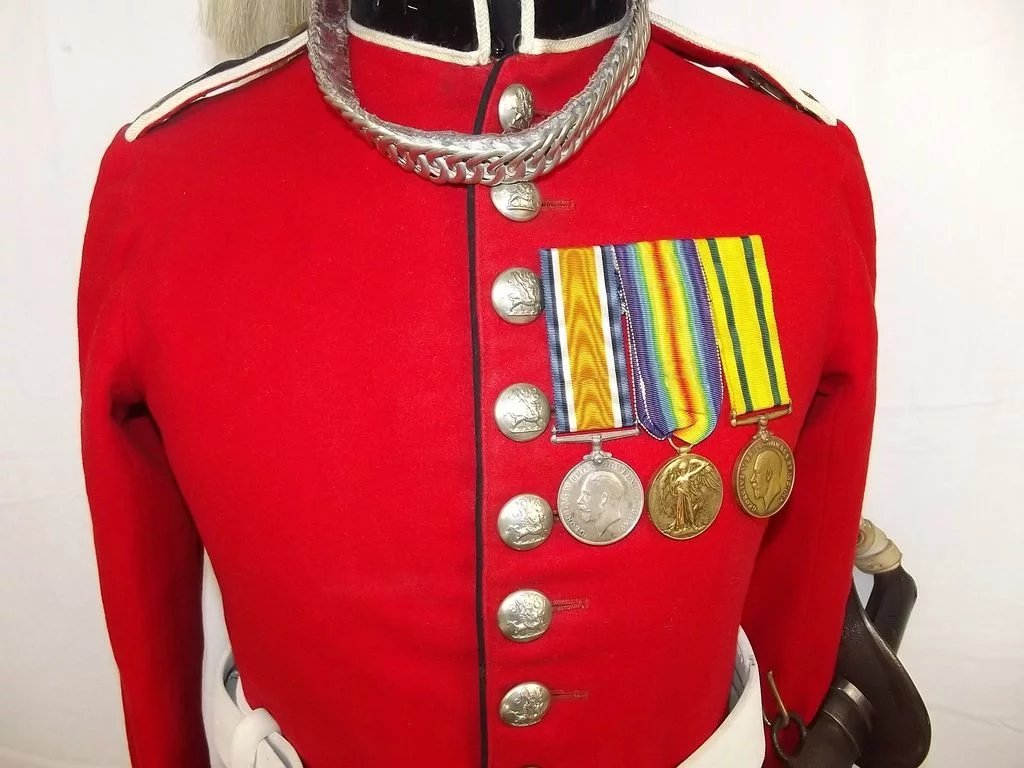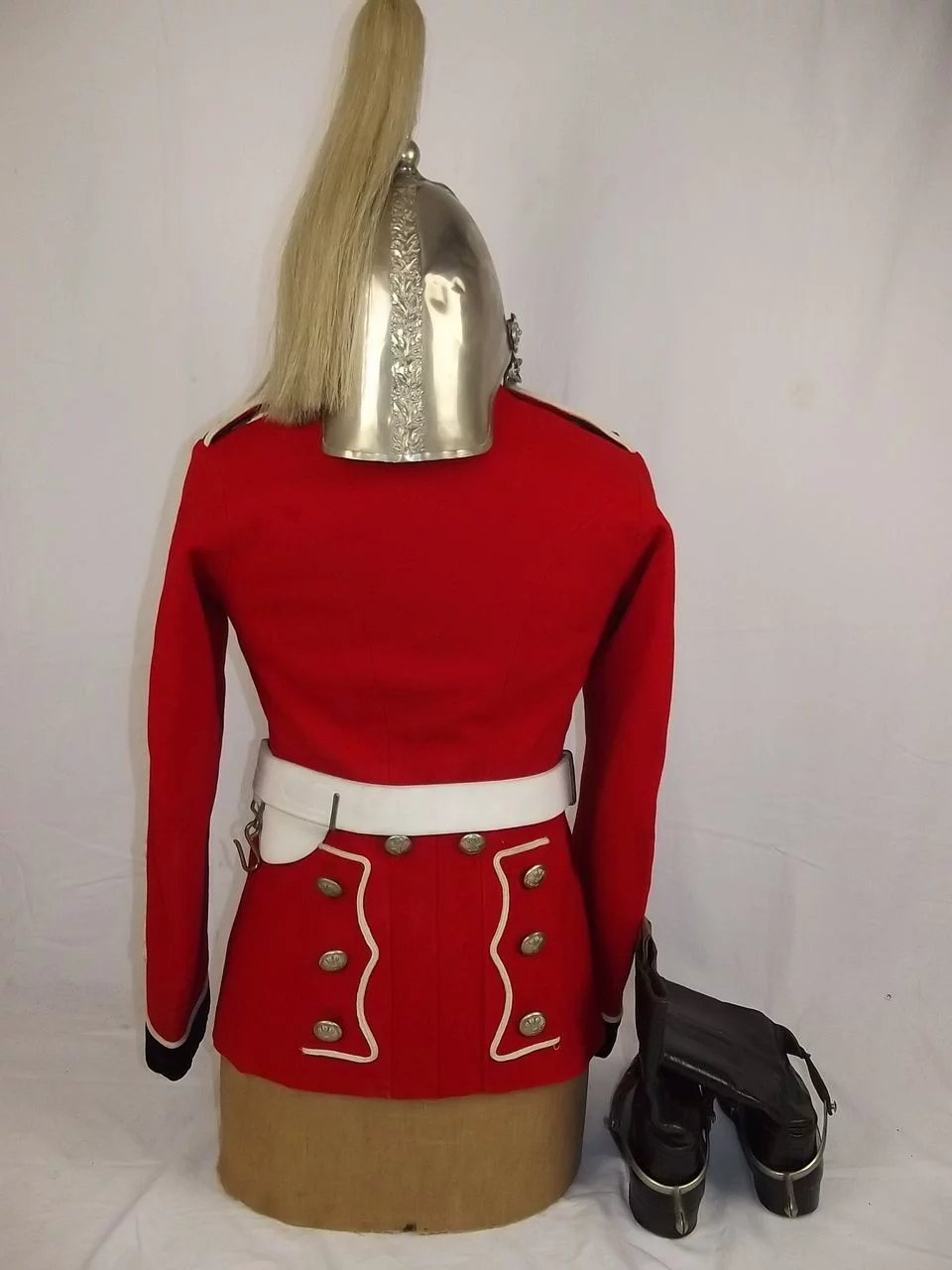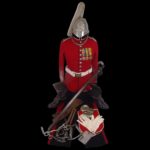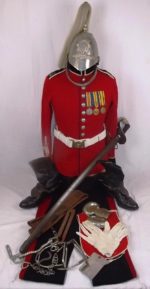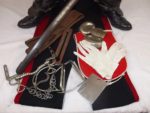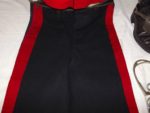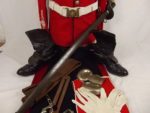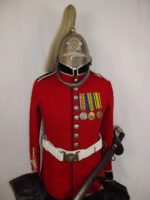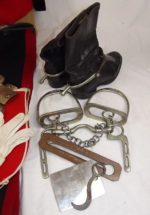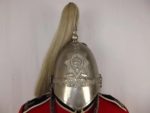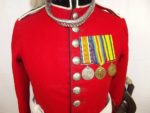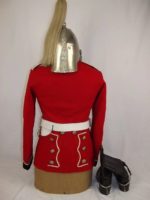~ WW1 Montgomeryshire Yeomanry Cavalry Complete Uniform Set ~
This uniform set is was worn and owned by the 1864 Private H. Roberts of the 1st Brigade Montgomeryshire Yeomanry. It is very rare unit and even rarer to find a complete set from them.
Firstly please note…
The sword is not included with the set due to the rules and regulations of this website – we are not allowed to sell it here. The price of this set applies only to all the other items.
The set comprises of 15 pieces: one helmet, one tunic with three medals, two metal epaulettes, one belt, one pair of trousers, a pair of white cotton gloves, a pair of leather boots with their spurs, two cavalry stirrups, a wooden button polishing screen, a hook, a metal plate (probably a metal mirror), a regimental ‘bib’ and a horse bit.
~ The Helmet ~
The 1871 pattern helmet bears the regimental badge on an eight cornered star.
The helmet is complete with its chin scales, leather lining and horse hair plume.
~ The Tunic ~
The scarlet tunic still bears the maker’s labels. The first label is made of silk and is attached on the collar; it reads… ‘J&B. Pearse & Co, 28 Floral St London W.C.’.
The second label is made of paper and is attached on the lower end of the tunic. Unfortunately the label is not preserved in its entirety but the name and number of the customer (1864 Roberts H., tunic number 783) along with a few of the measurements are still visible.
All its buttons are present and original as the shoulder badges are but the collar badges are missing.
The shoulder badges read ‘T Y MONTGOMERY’.
The buttons are of two types. The first one, present at the front of the tunic and at the top back (only two), has embossed on its face a dragon and the letters “MYC”. The second type is used on the back only (6 buttons) and has embossed on its face the crown with three feathers and letters “MC”.
The lining is made of white wool.
~ The Medals ~
The medal group comprises of The British War Medal 1914-1918, The Victory Medal 1914-1918 and The Territorial Force War Medal (For Voluntary Service Overseas 1914-19). All medals are engraved on the edge “1854 Pte H Roberts Montgom. Yeo.”.
The medals were polished at one point in time.
~ The Belt ~
The white leather belt is complete with its brass fittings and has numerous stamps on the back.
~ The Trousers ~
The trousers have no labels but they come with their original buttons embossed with the maker’s name ‘Pearse & Co. London’.
~ The Epaulettes ~
The white metal metal epaulets are unmarked. They come with two brass buttons, one for each, embossed with the regimental marks.
~ The Gloves ~
The gloves are made of soft white cotton fabric.
~ The Spurs ~
The boots spurs are made of metal with leather fittings, for attaching them on the boots. They are unmarked as well.
~ The Button Polishing Screen ~
It is made of wood and stamped “Prater B63”.
~ The Stirrups ~
Both stars are stamped on the side facing the ground with ‘HR’ and ‘Solid Nickel’.
~ The Bit ~
The horse bit is also stamped with ‘HR’ and ‘Solid Nickel.
~ The hook ~
The hook has no stamps or marks.
~ The Bib ~
The bib is red with white edges and two buttons on one side.
~ The Sword ~
For information only – not for sale.
The locket is stamped on one side ‘9’, ‘1893’, ‘Y/MG 175’. The other side is stamped the pattern number, which is not clearly visible anymore.
The sword comes with its leather bullion knot.
The ricasso and the edge of the blade are stamped with multiple Victorian proof marks, broad arrows, the making year ‘93’ and the maker’s mark ‘MX’.
The metal edge of the grip is also stamped with a Victorian proof mark.
The sword comes with its original scabbard and scabbard leather cover.
~ Dimensions ~
The helmet width is 9.8 inches (24.7 cm), its depth is 7.65 inches (19.5 cm) and its height is 14 inches (35.6 cm).
The tunic’s armpit to armpit width is 17.5 inches (44.5 cm), the shoulder to the bottom hem length is 26 inches (66 cm) and the sleeve length (starting from the armpit) is 17 inches (43.3 cm).
The medals are the standard size.
The trousers length is 48 inches (122 cm) and their waist is 17 inches (43.2 cm) across.
The belt length is 43.25 inches (110 cm).
The metal epaulettes width is 6.8 inches (17.2 cm) and its depth is 4.8 inches (12 cm).
The gloves length is 9.2 inches (23.5 cm).
The boots size is about EU 39-40/ UK 6.5-7 /US 7-7.5
The spurs metal component width is 5.1 inches (14 cm) and have a depth of 4 inches (10.2 cm).
The stirrups height is 5.65 inches (14.5 cm), their width is 5 inches (12.17 cm) and their depth is 2.25 inches (5.8 cm).
The wooden button polishing screen length is 8.6 inches (22 cm) and its width is 2.8 inches (4.5 cm).
The horse bit width is 9.65 inches (24.5 cm) and its depth is 7.2 inches (18.5 cm).
The bibs overall length (measuring both sides at the same time) is 23.2 inches (59 cm) and its width is 9 inches (23 cm).
The hook length is 4.5 inches (11.5 cm) and its depth is 1.5 inches (3.8 cm).
The metal plate/mirror width is 4.25 inches (11 cm) and its depth is 3.3 inches (8.5 cm).
For information only: The blades length is 34.5 inches (87.5 cm) and the overall length of the sword is 40 inches (101.5 cm). The sword with the scabbard length is 40.5 inches (102.8 cm). The scabbard leather cover length is 32.8 inches (83.4 cm).
The set weighs 5.3 kg.
For information only: The sword weighs 1.8 kg.
~ Condition ~
The helmet is in good condition for its age. The skull has some amount of dings and is a little twisted at the back. The inner nut from the horsetail is missing. The chin scales are complete and undamaged. The black leather lining is worn but still in one piece.
The tunic is in very good used condition. It has no moth holes. The only damage is at the rear side on the top right button, where a section of 1 by 1.5 inches has a coarse stitch. The lining is excellent. Its collar badges are missing.
The medal group is in good condition. The both the war and victory medals were polished at one point in time and this is clearly visible. The ribbons seem to be original.
The trousers have a moth hole (about 2 cm long) on the front top left leg. Fortunately the damage can be easily fixed.
The belt is excellent. The leather is very well preserved and its brass fittings are undamaged.
The metal epaulettes are in fair used condition. They both have some wear on their body, as expected for their age and use. Even so, there is no serious damage on the them and they both retain their original buttons.
The boots are in good condition for their age. The leather at the top is still soft and the soles are fine. There is no visible damage on them. They have the expected creasing from wear.
The boots spurs are in fair used condition. The metal components are excellent but the leather components have aging signs like cracks and mold spots.
The button polishing screen is excellent, except for the expected signs of usage.
The horse bit is undamaged, having only minor signs of wear.
The bib is in an overall good used condition with some tearing on the white edges.
The hook is in overall good condition with a spot of surface rust.
The mirror has multiple surface scratches and minor traces of oxide.
For information only: The sword in is a very good used condition. Except for the normal aging process of the metal, meaning the appearance of some surface pitting and general darkening on the scabbard, grip and guard, the sword is excellent. The blade is intact, with no damage or rust. It was well preserved and greased. The leather cover of the scabbard is worn.
~ Montgomeryshire Yeomanry ~
The Montgomeryshire Yeomanry unlike the other Yeomanry regiments was only formed in 1813 when the threat of a French invasion was almost over. They served as part of the Imperial Yeomanry during the Boer War and formed three regiments for service during World War I.
In accordance with the Territorial and Reserve Forces Act 1907 (7 Edw.7, c.9) which brought the Territorial Force into being, the TF was intended to be a home defence force for service during wartime and members could not be compelled to serve outside the country. However, on the outbreak of war on 4 August 1914, many members volunteered for Imperial Service.
Therefore, TF units were split in August and September 1914 into 1st Line (liable for overseas service) and 2nd Line (home service for those unable or unwilling to serve overseas) units. Later, a 3rd Line was formed to act as a reserve, providing trained replacements for the 1st and 2nd Line regiments.
~ 1st Montgomeryshire Yeomanry ~
The 1/1st Montgomeryshire Yeomanry was mobilised on 4 August 1914 as part of the South Wales Mounted Brigade on the outbreak of the First World War. The brigade was assembled at Hereford and moved to East Anglia by the end of August 1914. It joined the 1st Mounted Division in August 1914, replacing 1st South Midland Mounted Brigade which moved to 2nd Mounted Division. In November 1915, the brigade was dismounted. It was replaced in 1st Mounted Division by 2/1st Eastern Mounted Brigade when it departed for Egypt.
With the brigade, the regiment was posted to Egypt in March 1916. On 20 March, South Wales Mounted Brigade was absorbed into the 4th Dismounted Brigade (along with the Welsh Border Mounted Brigade). In March 1917 they were re-rolled as infantry and together with the Welsh Horse were converted into the 25th (Montgomery and Welsh Horse Yeomanry) Battalion, Royal Welsh Fusiliers. They joined 231st Brigade in the 74th (Yeomanry) Division. In May 1918, the Division moved to France, and the battalion saw action on the Western Front.

